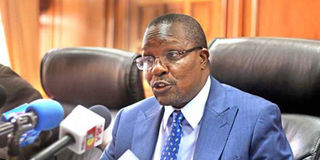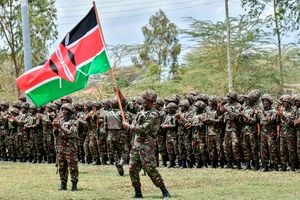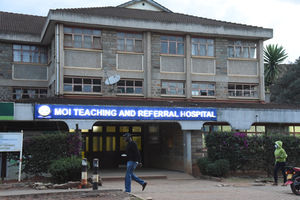MPs’ fight in Bunge over security laws was my lowest moment in public service- Sialai

Kenya’s High Commissioner to Namibia Michael Sialai.
National Assembly Clerk Michael Sialai recounted how the chaotic scenes that rocked the House on December 18, 2014 as it controversially passed the Security Laws (Amendment) Bill 2014 marked his lowest and toughest moment in years of public service.
Mr Sialai, while appearing before the House Committee on Defense and Foreign Relations for his vetting for appointment as Kenya’s High Commissioner to Namibia said that for the 27 years he has worked in parliament, he had never seen such chaotic scenes.
“I never slept on the night of that day. It was my toughest moment ever witnessed as Clerk of the House since I started my career as an employee of parliament,” Mr Sialai who is leaving after attaining the mandatory retirement age for public officers, told the committee.
The committee is chaired by Nyaribari Chache MP Richard Tongi.
The outgoing Clerk also told the committee that his close working relationship with staff in parliament especially in accounts and finance departments has made him a better manager and therefore qualified for the job.
“I am up to the task if posted to the destination and I hope to use this committee to actualize the many opportunities in Namibia for the country,” he said.
Mr Sialai first joined parliament as a Clerk assistant rising through the ranks to be appointed Clerk of the National Assembly in March 2017.
The Clerk was given an extension of 14 months last year, which came to an end in July this year.
He however, defended the MPs saying that they are human.
During the chaotic scenes, some MPs engaged in fist fights, others tore up the Order Paper and threw it on the floor while others sprinkled water on their colleagues.
At the end of it, some had swollen, torn clothes with Suba North MP Millie Odhiambo claiming that some MP had tried to handle her inappropriately.
At some point, House Speaker Justin Muturi was forced to adjourn the House intermittently with the hope that tempers would cool down.
The bone of contention was that the Bill that had some of its sections declared unconstitutional by the court, was injurious to the civil liberties enjoyed by Kenyans.
If appointed, Mr Sialai will succeed Mr Benjamin Langat, who left the mission to come and contest the Ainamoi parliamentary seat that he lost to Mr Silvanus Maritim in the 2017 general election.
In the recently concluded party nominations, Mr Langat floored Mr Maritim to clinch the United Democratic Alliance (UDA) ticket as he seeks to recapture the seat.
Yesterday, Yatta MP Charles Kilonzo sought to know whether Mr Sialai supports sports hunting after a picture Mr Langat had taken posing with a gun beside a carcass of Kudu in Namibia caused a storm on social media.
Mr Sialai said that while countries don’t allow sports hunting in national parks and game reserves, it is allowed in some private conservancies “but this should not be a ticket to kill the animals.”
“Some things may be lawful but morally wrong,” said Mr Sialai in reference to the sports hunting being allowed in private conservancies even as he promised to strengthen the ties that exist between Kenya and Namibia.
In 1977, the Kenyan government, by a legal notice, imposed a ban on all forms of hunting of wildlife to save their dwindling population.
The ban is still in force.
Thousands of tourists across the world flock into the country to see wildlife among them wildebeests, leopards, lions roaming the parks and game reserves.
But the animal numbers have reduced gradually with experts blaming poaching and human destruction of the wild habitats for the reduced numbers.
However, those supporting introduction of sports hunting argue it will preserve wildlife by encouraging better management and earn revenue that could be invested back into conservation and bring Kenya into line with her neighbours- Uganda and Tanzania as well as South Africa, all of whom profit from restricted sports hunting.
Gilgil MP Martha Wangare decried the failure to implement the three agreements Kenya has signed with Namibia and sought to find out from Mr Sialai how he will help in their realization.
The agreements relate to tourism, youth affairs and political and diplomatic consultations.
The two countries already have existing agreements in agriculture, aviation, health and education.
But Mr Sialai told the committee that implementation of the agreements lies with the executive and to some extent, the Kenyan Parliament.
Kenya has had cordial relations with Namibia over the subsequent regimes.
In 1964 Kenya donated a Land Rover vehicle to Namibia to aid in her liberation course.
Other than Mr Sialai, the committee also vetted Major-General Andrew Ikenye (Nigeria) and Ms Margaret Shava (Netherlands).
Ms Shava denied claims that she is related to the Kenyatta family.





